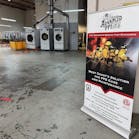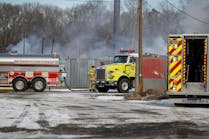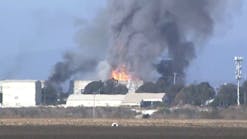KS EMS Workers Forced to Recycle Masks During Pandemic
By John Green
Source The Hutchinson News, Kan.
Editor's note: Find Firehouse.com's complete coverage of the COVID-19 pandemic here.
Local health care professionals are now relying on rows of paper sacks to help protect them in the battle against the novel coronavirus.
Both hospital personnel and emergency responders have been going through hundreds of high-quality N95 face masks daily since the outbreak reached Kansas and Hutchinson to protect themselves from catching the dangerous virus that is spread through aerosolized droplets from those who are infected.
RELATED:
- COVID-19: Firefighters Turn to More PPE, Precautions During Outbreak
- COVID-19: First Responders Caught in the Pandemic
Under normal circumstances, a provider would discard all the gear after dealing with a single patient to protect against the spread of the virus.
But the masks, along with other personal protective equipment, have been extremely difficult to come by because of the international nature of the pandemic.
Feared shortages resulted in developing new response protocols and practices to allow the equipment to be reused.
"We're using a practice of issuing each one of our medics with an N95 mask which they wear throughout their shift," said Dave Johnston, Reno County EMS chief.
The medics also wear donated protective coverings over the medically certified masks to keep them from becoming "grossly contaminated" from droplets, Johnston said.
Those salt-impregnated masks were created by HubCo and donated by Hyatt Life Sciences. The salt brine is also purportedly a barrier to the virus.
At the end of the shift, the employees put the N95 mask in a paper bag with their name on it.
"If it's able to sit and air out in a bag for 72 hours, it's free of the virus," Johnston said. "It cannot live."
Each mask is then used up to five shifts before a new one is issued to replace it.
"Everyone labels their masks and track the number of times it's decontaminated," he said.
If a mask does become grossly contaminated, it's still discarded and not reused.
"We're taking these proactive steps to conserve PPE, to ensure we have it in case a large surge does occur," Johnston said.
Other practices
The agency also has a small ozone scrubber in a box it can use to decontaminate its ambulances, an otherwise tedious process that must be done after every run.
It acquired the ozone machine previously for odor elimination, but it is labeled to kill viruses and bacteria in an enclosed area. It takes about two hours to process the air in a small area, Johnston said. A larger machine is on order that will do the job in 45 minutes.
"The nice thing about it, once it's up and running for the ambulances we'll be able to just open the cabinets and purge it, then ventilate it after that," he said.
"Our providers wear masks all the time they're on a shift," Johnston said. "They're surgical masks, not the N95s, but they were them all the time in post when they're not on call, even when they're at the hospital."
Also at the start of the outbreak, E-911 implemented a questionnaire protocol so responders have some idea before arriving on the scene if there is a chance of coronavirus exposure. They also have addresses flagged of people identified as possible cases.
If not provided the information, while en route, responders might call the residence where they are going to do an initial screen before they're on site or enter a building, Johnston said.
Change in protocols
"When we do arrive at a scene, typically we only send one responder in with a limited amount of equipment to do an initial screening and assessment," he said. "We also place a face mask on every patient we encounter to prevent droplet spread.
"During that initial assessment we determine if we need to escalate the levels of protective equipment. If indicated, we'll use masks, hair covers, boot covers, and gowns to render care. If it's known right away the encounter is a known carrier, we'll put everything on before we respond."
He doesn't believe the new protocols have affected care, Johnston said.
"We did have a downturn in volume in calls initially, but it's popped back up to normal ranges," he said. "Obviously it's more time-consuming ... It does take a little more time once we're on the scene and after the calls, it is more labor-intensive in the cleanup."
They started recycling N95 masks almost two weeks ago and have been using a tiered response since the first confirmed case in the county.
"We do believe we've got enough to get us through the next couple of weeks," Johnston said. "It's really dependent on if there is a surge how long our gear will last. We believe we'll get at least to the end of the month and into next month. We're being very conservative with its use, we really are."
Another step they took, Johnston said, was rejuvenating some expired masks.
"We had a small stockpile of expired masks with broken elastic bands," he said. "A family in town sewed in all-new straps on the masks for us to make them usable. We trusted their filtering, but there was no way to keep them adhered. That extended our stock a little bit too."
———
©2020 The Hutchinson News (Hutchinson, Kan.)
Visit The Hutchinson News (Hutchinson, Kan.) at www.hutchnews.com
Distributed by Tribune Content Agency, LLC.






